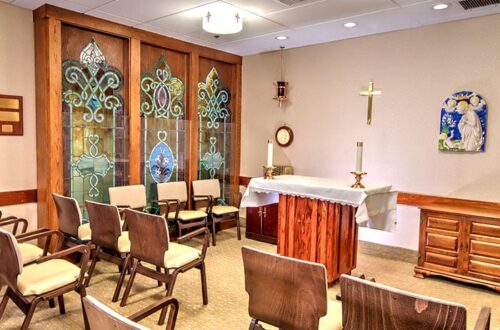Interfaith Chaplaincy: Nurturing Hope and Meaning in Senior Care
By Louise Landeta
Being a chaplain, also referred to as a Spiritual Counselor, is my calling. It is more than a job; it is a vocation.
At St. Paul’s Senior Services and St. Paul’s PACE, we embrace a faith-based approach and open our doors to individuals and families of all religions and spiritual outlooks. Our compassionate chaplains are readily available on-site, offering comprehensive emotional and spiritual support that respects and honors each person’s unique faith preferences and beliefs.
 There is a difference between being an interfaith chaplain in a medical setting and being a minister. We are not there to evangelize or convert anyone to our faith tradition. We are commissioned to provide spiritual care to our residents or participants. They may identify as Christians, Jews, Buddhists, Muslims, Hindus, agnostic, atheist, or other religions. In senior care, we acknowledge and honor that with which a person identifies. So, it is necessary to have a working knowledge of all traditions to provide the most holistic support.
There is a difference between being an interfaith chaplain in a medical setting and being a minister. We are not there to evangelize or convert anyone to our faith tradition. We are commissioned to provide spiritual care to our residents or participants. They may identify as Christians, Jews, Buddhists, Muslims, Hindus, agnostic, atheist, or other religions. In senior care, we acknowledge and honor that with which a person identifies. So, it is necessary to have a working knowledge of all traditions to provide the most holistic support.
We perform a spiritual assessment with each person. We do not have a checklist or bluntly ask people to answer specific questions. However, in the course of getting to know each person, we look for four major things:
- Do they have hope, and if so, for what?
- Do they believe their life has meaning?
- If so, what are some things that give them meaning? Do they have connections with others such as family, friends, and organizations?
- And lastly, and most importantly, do they have any issues with forgiveness or resentments? Is there anyone who needs to forgive this person? Does this person need to forgive someone else?
Forgiveness and resentments are enormous factors in causing spiritual pain.
We chaplains provide prayer, sacraments, and worship services to those who ask for these at St. Paul’s Senior Services. If the person’s faith tradition differs from ours, we seek out clergy of their preference to make a connection as well.
One of our participants here at St. Paul’s PACE immediately told me that he was an atheist and did not need my services. As we sat and talked, I learned that this man had no connections to family or friends and felt his life had no meaning. But he did speak about his love of Western novels and poetry. So that was our connection. I would bring western poems to read to him and leave with him. I provided him with several western themed books. I read some of the books myself and we had some lively talks about them. I discovered this man was a deep thinker and needed someone to listen to his ideas and life stories.
At St. Paul’s PACE, access to restricted areas requires a badge for entry. Occasionally, someone may unintentionally forget to use their badge, triggering a warning system. Each door is assigned a unique name, referred to as an Angel, accompanied by a corresponding number. To address such instances, our diligent receptionists take charge and utilize the PA system, announcing a message like “Paging Angel 4” until someone rectifies the situation.
On a particular day, after conducting a worship service, I entered the Day Center adorned in my pristine white alb. Within the center, several participants were seated, and it was then that one of them glanced up at me with astonishment and exclaimed, “Are you Angel 4?” The individual’s query carried a genuine tone, reflecting her sincere belief. Her beaming smile served as a reminder of the very reasons that led me to pursue this calling and persist in my chosen vocation.
About the Author: Louise Landeta has been a spiritual counselor with St. Paul’s PACE for over 5 years. She received her Master of Theological Studies Degree at the Franciscan School of Theology in partnership with the Graduate Theological Union in Berkeley, California.
Last updated on February 4

